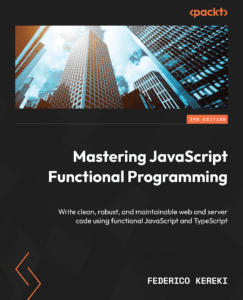Federico Kereki is the author of Mastering JavaScript Functional Programming; we got the chance to sit down and find out more about his experience of writing with Packt.
Q: What is the name of your book?
Federico: Mastering JavaScript Functional Programming
Q: What are your specialist tech areas?
Federico: I’m a Computer Systems Engineer, and my current focus is on Internet-based systems, including front-end and back-end development, cloud, etc. I am most interested in software development and quality.
Q: How did you become an author for Packt? Tell us about your journey. What was your motivation for writing this book?
Federico: I’m glad to say that after the initial proposal for this book, six years ago, we’ve reached now the book’s third edition. I think Functional Programming is a very valid tool to help develop quality software, and since JavaScript is everywhere today, joining those two topics was a no-brainer.
Q: What kind of research did you do, and how long did you spend researching before beginning the book?
Federico: I checked all the available bibliography, both printed and web-based, including Functional Programming in general (meaning, not just related to JavaScript). For the next editions, I kept reading everything I could get my hands on, and by following trends, I could update the book.
Q: Did you face any challenges during the writing process? How did you overcome them?
Federico: For the third edition, we complemented the book with TypeScript code. That proved sometimes to be a sort of blocker because, for some higher-order coding, TypeScript had problems understanding how typing was applied. Fortunately, there were solutions, the objectives were attained, and I think the book is now good for both JavaScript and TypeScript developers.
Q: What’s your take on the technologies discussed in the book? Where do you see these technologies heading in the future?
Federico: From my point of view, Functional Programming is a better paradigm and a safer way to achieve correct code. That said, I’m not a fundamentalist in that regard; as I wrote in the book, I rather went for “SFP” — “Sorta Functional Programming”, to also take advantage of JavaScript’s features, not feeling mandated to do absolutely everything in functional ways. I think Functional Programming is becoming more and more accepted and used (several web frameworks apply its concepts) so I see a bright future ahead.
Q: Why should readers choose this book over others already on the market? How would you differentiate your book from its competition?
Federico: Apart from the research –I cannot even number how many books and articles I went through– I think that the evolution of the book through its three editions, always updating and adding content, plus the very practical approach I took (eschewing existing libraries to actually show how things work) make the book practical for all developers.
Q: What are the key takeaways you want readers to come away with from the book?
Federico: My particular wish is to get readers in the right frame of mind to understand why we want to use Functional Programming, the value of doing things in functional ways, and the higher quality we may achieve by working in this way.
Q. What advice would you give to readers jumping into this technology? Do you have any top tips?
Federico: Throughout the book, I’ve provided dozens of questions; I would highly recommend that after going through a chapter, readers should tackle the questions to go further. I would also recommend readers not feel discouraged if at first some code or ideas are harder to follow; I do believe that by the end of the book, everything will have become clear, making sense, and showing all the advantages of this way of working.
Q. Do you have a blog that readers can follow?
Federico: I often publish articles at https://medium.com/@fkereki — in particular I’m writing a series of articles labeled “FOREVER FUNCTIONAL”, in which I show techniques, methods, and application of Functional Programming with JavaScript and TypeScript.
Q: Can you share any blogs, websites, and forums to help readers gain a holistic view of the tech they are learning? What are the key takeaways you want readers to come away with from the book?
Federico: I really don’t follow any specific blog — I’m always using Google to get the latest articles on Functional Programming, JavaScript, and TypeScript. I have to admit, though, that this can be a huge amount of reading; be warned!
Q. How would you describe your author’s journey with Packt? Would you recommend Packt to aspiring authors?
Federico: I think the whole writing process is well-planned and managed. I’ve had zero problems with the book, and whenever we had different ways of thinking, we’ve always been able to reach a common, satisfying solution. I would have no problem at all recommending Packt to other would-be authors.
Q. Do you belong to any tech community groups?
Federico: I’m active in MeetUp groups and always try to answer questions on sites such as Stack Overflow or Quora; that keeps me “on my toes”, ensuring I keep practicing and applying all the techniques I wrote about.
Q. What are your favorite tech journals? How do you keep yourself up to date on tech?
Federico: As I said, I google a lot, I very frequently access sites like Medium.com, Smashing Magazine, etc., and I also get plenty of emails with recommended articles; a whole lot of reading to do! Oh, I should also mention that whenever I have time, I like to access places that provide coding challenges; there are plenty of them, and they provide good practice!
Q. How did you organize, plan, and prioritize your work and write the book?
Federico: I started with a rough idea of the book structure (what chapters it would have, their contents, and sequence) and then I did the same for each chapter. That prepared, I just started writing — I try to get the text complete as soon as possible because then I can start editing it, getting it into shape, producing a better text, etc.
Q. What is that one writing tip that you found most crucial and would like to share with aspiring authors?
Federico: The main thing to remember is that until you have written everything, there’s no book. I always say “First write all, then edit, and edit, and edit”. I try to follow Stephen King’s suggestion that each editing phase should trim 5-10% of the text.
Q. Would you like to share your social handles? If so, please share.
Federico: I’m “fkereki” just about everywhere — LinkedIn, FaceBook, wherever!
You can find Federico’s book on Amazon by following this link: Please click here










